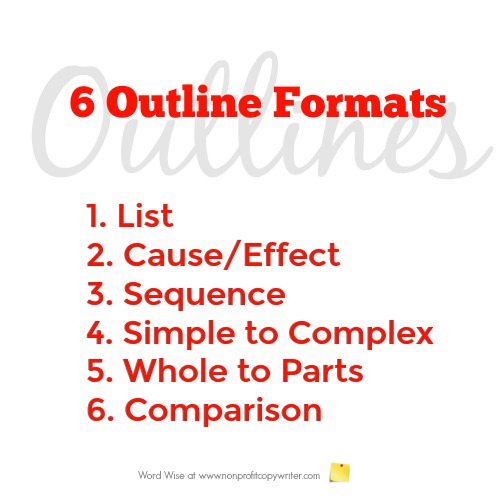Save Time: Get 5 Simple Writing Tips
you can put to use in 10 minutes
6 Outline Formats: Different Ways to Write an Outline For Your Content
Award-winning writer Kathy Widenhouse has helped hundreds of nonprofits and writers produce successful content , with 750K+ views for her writing tutorials. She is the author of 9 books. See more of Kathy’s content here.
You’re ready to write an outline: you have gathered ideas, processed them, and have determined the main point for your piece.
Now what?
No matter which kind of content you write – article, blog post, web page, email campaign, e-book, speech, other – you need to organize your material into a logical order.
Perhaps you’re one of those writers who instinctively organizes content into a clear framework. (Yes, the rest of us are turning green.)
But if you’re not … It is precisely at this point where you may hit the proverbial writer’s block. Don’t panic. Instead, take a look at these simple how-to’s. You’ll get some ideas to jumpstart your writing project and get organized so you can get writing.
6 Outline Formats: Different Ways to Write an Outline
Review your list of ideas and look for patterns. Sometimes the outline format is evident right away. If not, ask yourself two questions:
- If I wasn’t familiar with this topic or if the topic was confusing to me, how would I want it explained?
- What would I need to know first?
The answer to one or both of those questions can give you an indication about how to organize your information.
Use this list to see which type of outline format works best for your content.
1. List
This outline format organizes content in a list of topics or categories, arranged without hierarchy or sequence. The List outline is sometimes called a “listicle.” It’s simple and clear. One example is the post you’re reading right now: “6 Outline Formats: Different Ways to Write an Outline.”
2. Cause/Effect
Here, your content presents a problem (the cause) and an outcome (effect). This format is helpful to use in in persuasive writing when you introduce a topic to your reader and present a solution (or set of solutions). Check out “Does Your Headline Do Its Job?” which points out the need to hook your reader with an engaging headline (the problem or cause) – and presents a set of ways to do so (the outcome or effect).
3. Sequence
Content with a built-in structure is easy to put into an outline. The structure may be chronological (X happened, followed by Y, followed by Z) or a series of steps (First do Step A, then Step B, then Step C). The Sequence Outline is a good choice for how-to’s, such as “How to Write an Outline.”
4. Simple to Complex
This format is particularly useful for organizing content that complicated or confusing for the reader. You present one idea, followed by another that offers more detail, and another. The content is cumulative. In the end, the reader has a clearer understanding of the problem. One example of the Simple-to-Complex outline is “The Writing Process,” which opens with first step of writing a piece of content (getting ideas) and leads the reader to the finished product (proofreading.)
5. Whole to Parts
A Whole-to-Parts content outline Introduces a big picture point first and then explains the different parts individually – and how they connect or relate to each other. For instance, “How to Write Devotionals: Use a 3-Part Structure” opens with a summary about this genre’s format. The rest of the article goes on to explain each of the three parts of that structure and what each contributes to a devotional.
6. Comparison
With this approach, your ideas are organized to show how they are alike and how they are different. The Comparison outline shows two sides of the story. Here’s an example: “Writing Blogs vs. Writing Articles: What’s the Difference?”
More Tips for Content Writing
Content Writing: What It Is and Why You Need It ...
What is Free Content and Why Should I Offer It?
Tips for writing a hook for your content ...
6 Tips for Writing Powerful Endings ...
How to write a conclusion: 3 tips ...
How to Write a Thesis Statement ...
5 Web Content Copywriting Tips for Newbies ...
Identity Content: 3 Tips for Explaining Who You Are and What You Do ...
Get Powerful Content When You Ask this ONE Question ...
Repurposing Content: get 21 pieces of content from one ...
7 Content Ideas to Build Your Audience ...
How to Set and Achieve a Writing Goal ...
More Tips for Writing Content on our Pinterest board ...
Return from 6 Outline Formats to Nonprofit Copywriter home
As an Amazon Associate I earn from qualifying purchases.
Share This Page

Named to 2022 Writer's Digest list
BEST GENRE/NICHE WRITING WEBSITE


Stop Wasting Time!
Grab your exclusive FREE guide, "5 Simple Writing Tips You Can Put to Use in 10 Minutes or Less"












